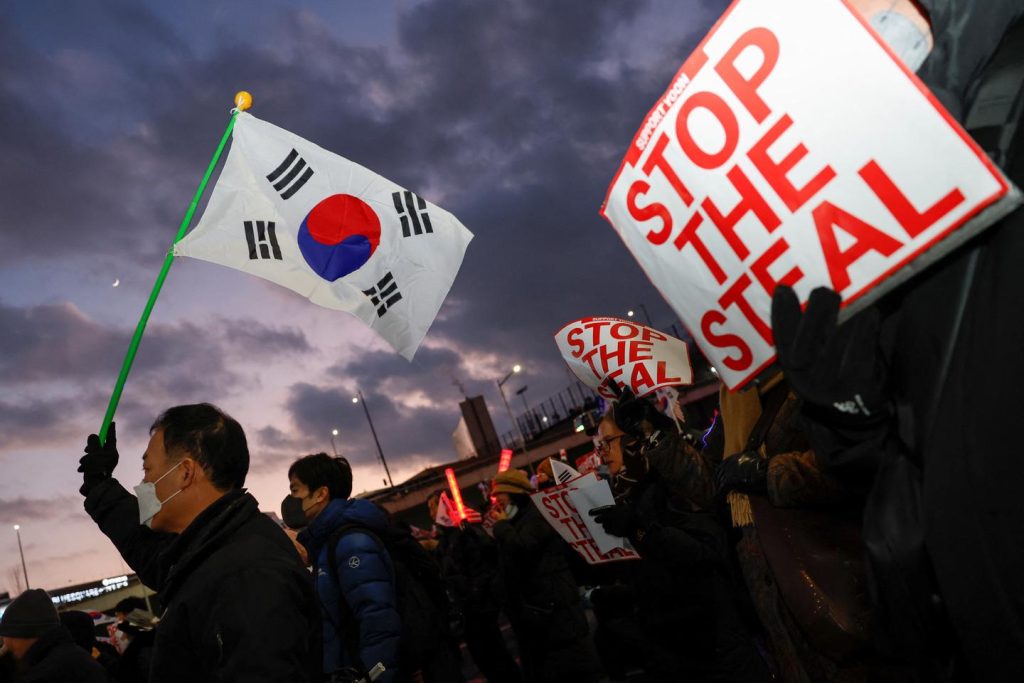South Korea, with its “semi-presidential” constitutional system (bicephalous executive with a president elected by direct universal suffrage and a prime minister appointed by the president with the confidence of the Assembly), recently provided a lesson in democracy that France should urgently take inspiration from. The use of full powers, decided at 10:30 p.m. by South Korean President Yoon Suk-yeol on the night of December 3rd to 4th, under Article 77 of the South Korean Constitution, was lifted by the National Assembly in a majority vote just a few hours later, while the army, which was trying to block access to the Parliament, was prevented by thousands of spontaneously outpouring demonstrators in an incredible democratic surge.
Ten days later, the president was impeached by a vote of the parliamentarians, with a two-thirds majority, including members of his own party. While this impeachment still needs to be confirmed by the Constitutional Court, Yoon is also facing criminal charges, and it is likely that he will be sentenced to a very heavy prison term, or even the death penalty, for his attempted coup. One of his predecessors, Park Geun-hye, was sentenced to twenty-two years in prison after her impeachment, specifically for corruption. If this attempted coup, allowed by the inclusion of martial law in the Constitution, could be defeated, it is because the text in question, allowing for a temporary dictatorship, nevertheless gives the Assembly the means to oppose it without delay.
This is more of a safeguard than our Article 16, which gives the president discretion to declare a state of emergency and terminate it without any authority being given the means to oppose it – neither the National Assembly nor even the Constitutional Council, as only the possibility of an “opinion” (not a decision) of the Council is provided for, optional after thirty days, mandatory after sixty days. As the South Koreans have understood well, in the case of a coup, it is essential to react very quickly – everything is determined in the first hours. The swift response from the South Korean people and their democratic institutions in the face of the attempted coup sets an example for other countries, including France, in terms of defending democracy and the rule of law in moments of crisis.
France could learn from the South Korean experience in terms of constitutional safeguards and mechanisms for preserving democracy in times of crisis. The ability of the South Korean National Assembly to swiftly overturn the president’s imposition of full powers and subsequently impeach him demonstrates the importance of a strong legislative branch and clear procedures for checks and balances in a constitutional system. The quick and decisive response of the South Korean people, who took to the streets in protest against the coup attempt, also shows the power of popular mobilization and civic engagement in defending democracy against authoritarian threats.
The comparison between the South Korean constitutional provisions and those of France, particularly regarding the declaration and termination of a state of emergency, highlights the need for greater scrutiny and accountability in executive decision-making during crisis situations. The South Korean Constitution’s clear provisions for the temporary imposition of martial law and the role of the National Assembly in opposing it contrast with the more ambiguous and potentially unchecked powers granted to the French president under Article 16. By reforming its constitutional framework to include stronger safeguards against authoritarianism and mechanisms for rapid response to threats to democracy, France could better protect its democratic institutions and uphold the principles of the rule of law.
As the South Korean example shows, the ability of democratic institutions and the people to respond swiftly and decisively to threats against democracy is essential in times of crisis. By learning from the South Korean experience and implementing reforms to strengthen its constitutional safeguards and democratic processes, France can better defend against authoritarianism and protect the rights and freedoms of its citizens. The events in South Korea serve as a reminder of the importance of vigilant and active citizenship in preserving democratic values, and offer valuable lessons for other countries facing similar challenges in defending their democratic systems against internal and external threats.


